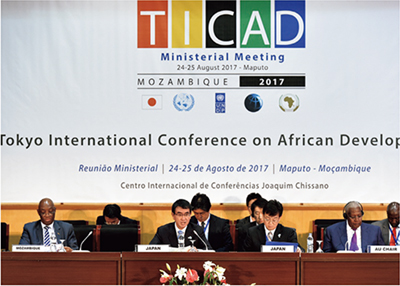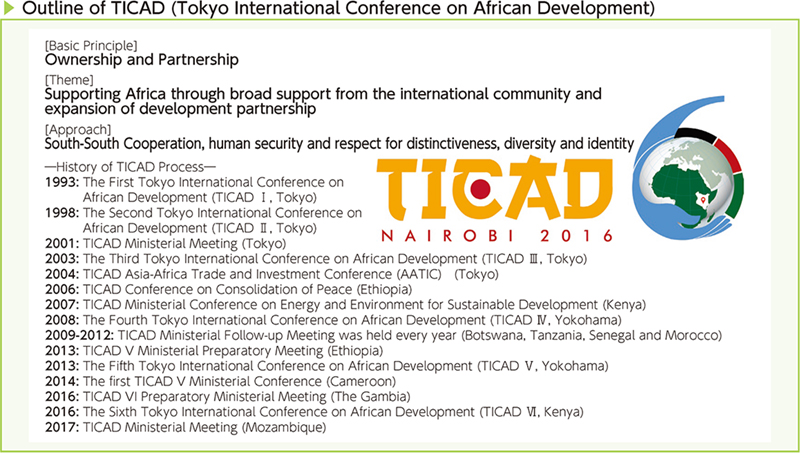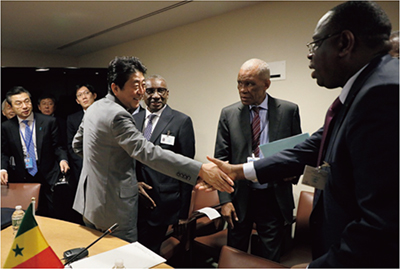Diplomatic Bluebook 2018
Chapter 2
Japan's Foreign Policy that Takes a Panoramic Perspective of the World Map
Section 7 Africa
Overview
Africa, with a population over 1.2 billion in 54 countries with diversity, attracts the interest of the international community, owing to its high market potential and rich natural resources. This is one of the reasons why the influence of African countries on consensus-building is expanding in the international community.
On the other hand, long-standing challenges such as political unrest, severe disparities and poverty remain unsolved in Sub-Saharan Africa, while recently other challenges have emerged, such as the vulnerability of the health systems and the rise of violent extremism. Furthermore, their economic growth has slowed down compared to the previous years, due to the deceleration of emerging economies and the decline of global commodity prices.
As the impact of these issues transcends national borders, it is crucial for African countries to overcome these challenges and achieve stable growth for the peace and stability of not only Africa, but also the international community as a whole, including Japan.
TICAD is an international forum for African development, co-organized by the UN, the UNDP, the World Bank and the African Union Commission (AUC) under the leadership of Japan. TICAD was launched in 1993, under the basic philosophy of “ownership (self-help efforts)” of Africa and “partnership” with the international community including Japan. While TICAD Summit Meetings were held in Japan once every five years in the past, responding to the recent request from the African side, TICAD Summit Meetings are now set to be held once every three years since the sixth summit, alternately in Africa and Japan.
At the sixth TICAD (TICAD VI), which was held in August 2016, in Nairobi, Kenya, Prime Minister Abe announced that for a period of three years from 2016 to 2018, Japan will invest in the Future of Africa, through implementing measures including human resource development to 10 million people by making use of quality, Japan's strength, which amounts to approximately 30 billion US dollars under public-private partnership. At the closing session, the Nairobi Declaration was adopted as the TICAD VI outcome document outlining the achievements of TICAD VI based on the discussions in each session, and the “Nairobi Implementation Action Plan” was announced.
In August 2017, a TICAD Ministerial Meeting was held in Maputo, the capital of Mozambique. Foreign Minister Kono and Parliamentary Vice-Minister for Foreign Affairs Manabu Horii attended the meeting. In the meeting, participants reviewed the progress of the commitments announced at TICAD V and VI. Following the meeting, “TICAD Progress Report 2017” and “Japan's Initiatives 2017” were released and, Co-chairs' Summary was produced, compiling the main points of the discussions. The support that Japan provided was highly appreciated from many African countries.
 Foreign Minister Kono making a speech at the TICAD Ministerial Meeting (August 25, Maputo, Mozambique)
Foreign Minister Kono making a speech at the TICAD Ministerial Meeting (August 25, Maputo, Mozambique)
Based on the policies and measures hammered out at TICAD, Japan is working to strengthen relations with African countries in various fields. In the field of peace and stability, while Self Defense Force Engineering Unit personnel in the United Nations Mission in South Sudan (UNMISS) have returned to Japan, the deployment of personnel to the UNMISS headquarters is still ongoing. Japan has continued to contribute to the enhancement of the capabilities, etc., of those Africans participating in peacekeeping operations (PKO) through the provision of support for PKO training centers in African countries and training courses organized by the UN. In September, in the margin of the UN General Assembly, Prime Minister Abe held a summit meeting with African leaders including those of UN Security Council member countries, and Foreign Minister Kono hosted a dinner meeting for African foreign ministers at which he introduced Japan's contributions to the resolution of issues relating to peace and stability in Africa and also discussed issues such as North Korea and reform of the UN Security Council.
 Summit meeting with leaders of African countries serving as members of the UN Security Council and others (September 18, New York, U.S.; Photo: Cabinet Public Relations Office)
Summit meeting with leaders of African countries serving as members of the UN Security Council and others (September 18, New York, U.S.; Photo: Cabinet Public Relations Office)On the economic front, in May, Parliamentary Vice-Minister for Foreign Affairs Takei led the Joint Mission for Promoting Trade and Investment to Africa and visited Nigeria and Morocco, where trade and investment promotion seminars, social functions with local business figures, and other events, were held. This was one of the initiatives introduced at TICAD VI in response to the high expectations of Japanese companies to expand their activities into Africa. At the “Japan-Africa Private Sector Dialogue” event, which was held as a side-event at the TICAD Ministerial Meeting in August, the importance of the roles played by Japanese and African private sector companies' rate in African development and economic growth was underscored. At a meeting of the Ministerial Meeting on Economic Strategy for Africa, which was established under the Deputy Chief Cabinet Secretary, it was affirmed that the Government of Japan would gather its expertise to pursue initiatives developed based on the outcomes of TICAD VI. These initiatives include the promotion of concrete policies and measures such as comprehensive region wide development in the three priority areas of the West Africa Growth Ring, the East African Northern Corridor, and the Nacala Corridor. In addition to the bilateral investment treaties that are already in effect with Kenya and Mozambique, consultations are underway for bilateral investment agreements with Angola, Uganda, Ethiopia, Ghana, Côte d'Ivoire, Zambia, Senegal, Tanzania, Nigeria, Madagascar, and other countries.
Japan continued to strengthen cooperation with the African Union (AU) or other entities. Japan is planning to further strengthen relations with the AU and African countries particularly through the establishment of Mission of Japan to the African Union in the beginning of 2018.
In addition, Japan is also working, through discussions on Africa-related policies, to share information and cooperate on policies with other countries such as the U.S., the UK, France, and India.
